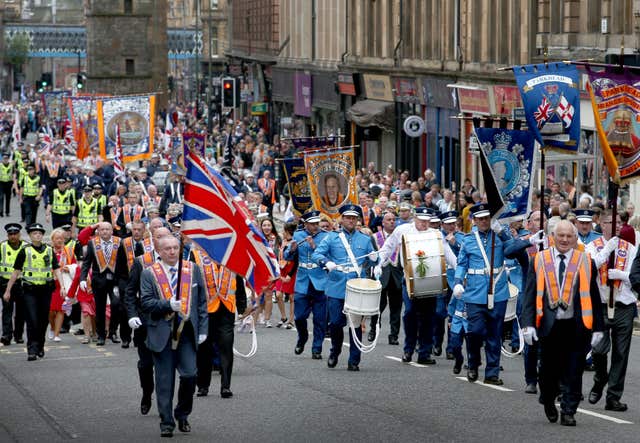
A proposed Orange Order march through Glasgow is likely to “substantially raise” tensions at a time when positions are becoming “more polarised”, a police chief has warned.
In a submission to Glasgow City Council’s Public Processions Committee on Monday, Superintendent John McBride briefed councillors after an application was submitted by the County Grand Orange Lodge of Glasgow for a procession to be held in the city on June 8.
Four marches at the weekend had been due to pass by a church where a Catholic priest was attacked last year.
However two of the marches were called off after groups failed to overturn a council decision to re-route them.
A decision had been taken to move the marches away from a stretch of London Road passing St Alphonsus RC Church, where Father Thomas White was spat on.
In his submission, Mr McBride indicated that a procession past the church on May 18 had required a police presence in excess of 100 officers – a rise on a conventional policing operation of 11 officers for a comparable parade in July last year.
Mr McBride said that in recent weeks there had been a “distinct and frankly troubling change in the terms and tone of commentary and rhetoric about Orange Order and/or ABOD (Apprentice Boys of Derry) processions going past St Alphonsus and/or St Mary’s churches, in the Calton”.
He said that the positions of those on both sides of the argument were becoming more polarised.
He wrote: “It is accepted that a difference of view about such things is, of course, nothing new, but as previously submitted, the recent language has been more strident, on both sides of the argument, and positions are becoming more polarised. ”
The superintendent said that abusive language could be heard coming from supporters of the parade held on May 18 as it passed St Alphonsus.
His submission read: “In the course of the parade of 18 May, as it went past St Alphonsus there was heard – quite distinctly from within those supporting the parade – shouts of ‘f****** b*******’ and ‘paedos’.
“I think it fair to say that the abuse was directed towards those in the counter protest.”
Threats of violence made on social media were also highlighted by the superintendent, noting that it evidenced hardening attitudes.
He wrote: “Social media posts regarding use of pipe bombs and burning vehicles has also been noted and whilst I would not advocate that this is a serious threat, it does go some way to evidencing the hardened attitudes of some.”
In his assessment of the planned procession on June 8, Mr McBride said he would “fully expect” a repeat of the events on May 18, while highlighting “further entrenched views for both supporters of, and protesters against, the parade”.
He estimated that the procession would have a “significant and disruptive impact on the life of the local community”, as well as saying that it would “place an excessive burden on Police Scotland as far as deploying resources necessary to mitigate the risks arising is concerned”.
Mr McBride concluded: “The proposed procession is expected to substantially raise local experienced and evidenced tension; that this rise in tension may be localised within the geographic area or, more broadly, the local communities.”

Following the decision to reroute the marches away from the church last week, a spokesman for the Grand Orange Lodge of Scotland said: “We are disappointed with the outcome today.
“We have always followed the process set out by Glasgow City Council, and we simply asked that they were made to follow their own process too.
“However, despite today’s ruling, we will continue our fight for fairness and equality for people of all faiths.
“We simply want to be able to celebrate our own beliefs, just as all other faiths can celebrate theirs.
“A Roman Catholic church, located on a street in Glasgow, should never be seen as a threat to any other faith, in the same way that Protestants quietly walking past that church should not be seen as a threat either.
“Creating religious no-go zones in Glasgow, the first UK city to impose such orders, will only create further divides and raise tensions that otherwise do not exist.
“Glasgow City Council and Police Scotland must put an end to this unjust, unfair and discredited practice of religious segregation.
” People of all faiths and none should be able to live together, accepting each other’s religious differences, without the need for religious divides.”
A Glasgow City Council spokesman said: “Members chose to re-route the procession after considering significant concerns about its potential impact on the community and police resources, should it go ahead on its original route.
“This decision is necessary, proportionate and maintains the organiser’s right carry out a public procession.”


Comments: Our rules
We want our comments to be a lively and valuable part of our community - a place where readers can debate and engage with the most important local issues. The ability to comment on our stories is a privilege, not a right, however, and that privilege may be withdrawn if it is abused or misused.
Please report any comments that break our rules.
Read the rules here